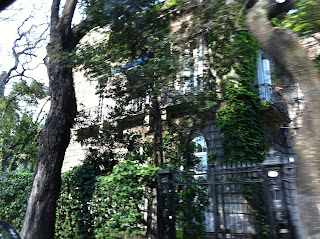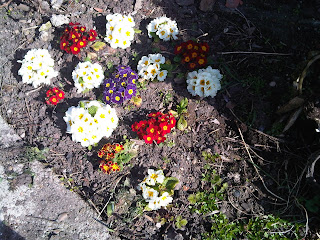Today, family and friends said goodbye to Ann in a service
and celebration that she had planned herself. The work of bringing Ann’s plans
to fruition largely fell to Sue who did a magnificent job. It was a day of
which Ann would heartily have approved.

The Requiem Mass was led by Father Patrick Gilsenan with
readings from Bibi Bugg of the Veteran-Cycle Club (Isaiah 25: 6-9), Jan Wilems
(St Paul to the Romans 14: 7-12); two hymns, Pie Jesu and Ave Maria sung by
Sharon Bower; Shakespeare’s Fear No More read by Ann’s brother, Richard and the
eulogy that I was privileged to share with Sue Thorne.
Sue gave an entertaining and moving tribute to Ann,
especially to her determination in the big things, which Sue contrasted to Ann’s
impatience with anything she deemed not worth the effort. As she said later,
anyone who has had a Christmas present from Ann will know that she soon tired
of putting effort into neat wrapping.
Sue recounted Ann’s struggle for independence with a
wheelchair – a long hard struggle that she won hands down, starting with a
foray of 10 yards up the road and ending with regular 10 kilometre walks, and how the new sporty chair became Ann’s
pride and joy. Ann’s last 10 kilometre trek was completed when she was already
ill just before her diagnosis.
Sue also recounted the time, during one of these endurance
tests, when Ann, misjudging a backward manoeuvre up a kerb in her new
lightweight chair, had catapulted herself into a full backward somersault from
which she picked herself up, climbed back into the chair and completed the
course.
At the crematorium service, Ann’s choices of music were a
song I've never heard before, the beat of which is in my head as I type but I can’t
remember the name of it. I will find it out and edit it into this blog. *It was John the Revelator* The second
was Into the West, a lovely evocative song by Annie Lennox that brought tears to many eyes. And
finally, Blackbird by the Beatles .
Family and friends gathered at the Horseshoe Bar where Sue
had organised a superb feast at Ann’s behest, and where there were photographs
of Ann to spark new memories.
A year or so after the diagnosis that gave her six
months maximum and probably no more than three, Ann had joked that people would
get fed up with her taking so long to die and the church would be empty at her
funeral. In fact, both the church and the crematorium were packed as was the Horseshoe,
and many friends not able to be there had sent their best wishes. Over the past
year Ann was in touch with many old friends and had said how pleased she was to
have been able to make those final contacts by way of saying her goodbyes.
I can’t reproduce
Sue’s exact words about Ann. She spoke from the heart, without a script and from
a few scribbled notes. She did Ann proud in every respect. I was honoured that Ann asked me to share the
eulogy with Sue. It was both one of the easiest things and one of the hardest
things I’ve done.
This is what I said about Ann:
In the
summer of 2011, soon after her diagnosis, Ann told me she was sorry we wouldn’t
make the 50th anniversary of our first ever meeting. She laughed about it. She
never stopped being able to laugh. But we made that anniversary. In September
this year we passed that 50 year mark.
I first met
Ann at Mylnhurst Primary School in Sheffield. It was in 1962 at the start of
the school term. We were 7 years old. She was a newcomer, fresh from Bangor in
Ireland. Looking back now I can see how intimidating it must have been for a
newcomer, dumped into an inquisitive gaggle of young children and left to fend
for herself. But she was never intimidated, not by the cleverest in the class nor
the sportiest. She would take on anyone. In fact I’m pretty sure Ann was the
instigator of the boys versus girls fights that were all the fashion that year.
My most
vivid memories of Ann in those early days were not so much her physical
fearlessness, but her mental prowess. She burst in upon us and raised our
political awareness. We knew the name of the Queen, and we were fairly well
versed in church politics (it was that sort of school) but many of us were
shaky on details such as who was prime minister and who were the major
political parties of the day. Ann could not only name the Prime Ministers of
this country and others, she could name their ministers and talk about their
economic policies. She even knew what a cabinet was in this context.
The schools
we shared were places that put a high premium on academic achievement in the
sense of passing exams, but Ann introduced us to a wider knowledge of the
world, especially of politics. She made political discussion and thinking cool…
hip… trendy. And this is when we were 7 and 8 years old. I for one was very impressed by the breadth
of her knowledge. It was something I wanted to emulate, and never stopped
wanting to emulate.
Ann was a
rarity in our world. What I didn't come to appreciate until many years later
was that she was a rarity in anyone's world. I’ve spent many years of my
working life teaching in a university, a large part of which is teaching people
how to think, how to be objective, how not to be swayed by bias and rhetoric.
Ann had arrived in my life aged 7 with all those capabilities already in the
bag.
Later at
secondary school, Notre Dame in Sheffield, some of the more enlightened
teachers would invite political debate and often find themselves flummoxed if
they crossed swords with Ann. I have memories of several retiring cross in the
face of Ann’s reasoned argument, resorting to exercising their authority to
change the subject.
One example
that sticks in my mind concerns a long-suffering French woman who came in once
every few weeks to try to teach us about France. In the midst of a raging
debate with Ann over the Common Market, during which the teacher became more
and more apoplectic - having invited debate, she hadn't expected disagreement,
and reasoned disagreement at that - she suddenly announced that every word must
be spoken in French. I remember Ann laughing ruefully afterwards at how the
subtleties of her carefully built argument had crumbled. She could probably
have written the essay but those were the days when French conversation in
schools came a very poor second to grammar and the written word.
Ann moved to
Sheffield High School for her A levels and then on to Sheffield University. But
like me she left school not really clear on what career to pursue. We kept in
touch in those post-school years, though in that careless way one does at that
age where you just assume you won’t lose touch with people. Indeed Ann and I
might have drifted apart but for bumping into each other one day. Literally. I
turned a corner into Clarkson Street in Sheffield and bumped into Ann. It
turned out we were working in different places but in very similar roles. Ann
was then working in the pathology labs at Sheffield Children’s Hospital. We
arranged to meet for a drink – in the West End pub if memory serves. When we
met, we just picked up where we’d left off as though there had never been a
gap.
And it’s
always been like that. From that time, we never lost touch though it would
sometimes be a few years between meetings especially after she moved to
Birmingham. At university there she completed her law degree and she also met
and married Jim. It was typical of the relationships Ann built with people that
despite their later divorce, they remained close throughout her life.
In all the
time I knew her, Ann never lost her disdain for ignorant rhetoric and those who
fall under its spell. Over the years her name popped up in places as diverse as
the Guardian and the pages of cyclists’ magazines, where her letters or
articles would forensically demolish some popular myth. Her article, A Pyrrhic Victory, in Connecting Linkmagazine was classic Ann exploding the myths of the smoking debate.
I've
treasured my friendship with Ann. I've valued her integrity; that I could trust
her to tell it how it was; that she didn't suffer fools gladly and that included
me when I’d been a fool. It took me a long time to appreciate how rare these
qualities were, but I'm grateful to Ann for being one of the reasons I grew up
expecting high standards of the people I met along the way. Precious few reached
them, but I learnt how to value the precious few. I'm also grateful that I was
given the chance to tell Ann what our friendship meant to me.
And 18
months ago Ann amazed me all over again with the way she responded to her
diagnosis. She took it in her stride and made the best of it. She didn't let it
wreck what was left of her life, which at that time she thought would be over
before Christmas 2011. She didn't want to be called brave; didn't see herself
as brave. She saw it as just taking the most sensible course of action. I guess
the same way she saw all her other qualities as just the right way to do
things. I'm not sure she ever appreciated what a special person she was, but I
guess very special people rarely do.
Of course
she had worries and regrets and must have had times of fear and despair, but
they never overwhelmed her. The last time I saw her – three weeks before she
died – she was still laughing at life, still living it, still in essence the
very same Ann I’d met 50 years previously.
It’s
terrible that Ann had to die so young, but it’s a comfort to know that she had
Sue with her throughout; that she couldn't have been better looked after during
her illness; and that she died peacefully at home with those she loved. She
touched and enriched more lives than she ever realised. She was inspirational. It
was a real privilege to know her. She will be very badly missed.
















